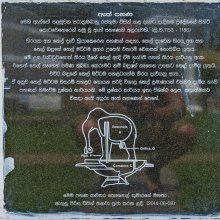Davi, Ḍāvī: 1 definition
Introduction:
Davi means something in Hinduism, Sanskrit. If you want to know the exact meaning, history, etymology or English translation of this term then check out the descriptions on this page. Add your comment or reference to a book if you want to contribute to this summary article.
Images (photo gallery)
In Hinduism
Shaivism (Shaiva philosophy)
Source: SOAS University of London: Protective Rites in the Netra TantraḌāvī (डावी) refers to a “group of supernatural beings” that cause illness, according to the Netratantra of Kṣemarāja: a Śaiva text from the 9th century in which Śiva (Bhairava) teaches Pārvatī topics such as metaphysics, cosmology, and soteriology.—The Netratantra’s Second Chapter begins with the goddess Pārvatī’s request that Śiva reveal to her the remedy for the ailments that afflict divine and worldly beings. [...]. Śiva adds to the list of maladies a group of supernatural beings that cause illness: [e.g., Ḍāvīs], [...]. That Śiva discusses supernatural beings that cause such disease demonstrates how invisible forces affect the world in observable ways. In order to counter these forces, Śiva reveals another invisible but observable element, mantra.

Shaiva (शैव, śaiva) or Shaivism (śaivism) represents a tradition of Hinduism worshiping Shiva as the supreme being. Closely related to Shaktism, Shaiva literature includes a range of scriptures, including Tantras, while the root of this tradition may be traced back to the ancient Vedas.
See also (Relevant definitions)
Starts with (+38): Davi-ghalanem, Davia, Davia, Davia, Davibhagavatapurana, Davida, Davidi, Davige, Davijilakara, Davika, Davikakula, Davike, Davila, Davina, Davis mountain mock vervain, Davis root, Davishtha, Davishtham, Davita, Davittha.
Ends with (+93): Acyutapadavi, Adavi, Agrapadavi, Aindavi, Amarapadavi, Amutavi, Antahpadavi, Anupadavi, Arthapadavi, Arudhapadavi, Atish kadavi, Attadavi, Audavi, Aupabindavi, Aupavindavi, Badavi, Baindavi, Bhadavi, Bindavi, Caturvidhapadavi.
Full-text (+3): Davis root, Davis mountain mock vervain, Dav, Davi-ghalanem, Ammodaucus leucotrichus, Delphinium geraniifolium, Bharanem, Rubus cuneifolius, Amelanchier utahensis, Dava, Delphinium carolinianum, Monochoria hastata, Viola palustris, Gudhi, Deva, Shambara, Thalictrum pubescens, Kutagara, Erythronium grandiflorum, Delphinium glaucum.
Relevant text
Search found 16 books and stories containing Davi, Ḍāvī; (plurals include: Davis, Ḍāvīs). You can also click to the full overview containing English textual excerpts. Below are direct links for the most relevant articles:
Bihar and Eastern Uttar Pradesh (early history) (by Prakash Narayan)
Buddhist views on caste < [Chapter 4 - Social Process, Structures and Reformations]
Egypt Through The Stereoscope (by James Henry Breasted)
Position 74 - The Valley Of The Kings' Tombs At Thebes, Where The Great Conquerors Of Egypt Were Buried < [Standpoints In Egypt]
Samkhya thoughts in the Mahabharata (by Shini M.V.)
Mahat (synonym of Buddhi) < [Chapter 2 - The Principles of Sāṃkhya Philosophy]
Mind (the eleventh organ) < [Chapter 2 - The Principles of Sāṃkhya Philosophy]
Contribution of Vachaspati-Mishra to Samkhya System (by Sasikumar. B)
Chapter 3 - Epistemological and Ontological Concepts (Introduction)
Bodhisattvacharyavatara (by Andreas Kretschmar)
Diaspora of Bhuta (Daiva) worshipping cult—India and Indonesia (by Shilpa V. Sonawane)
Part 4 - Agama Hinduism followed by Hindus in Bali Indonesia < [Chapter 4 - Inter-Disciplinary Analysis]

